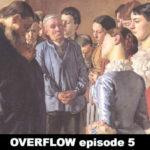We run our website the way we wished the whole internet worked: we provide high quality original content with no ads. We are funded solely by your direct support. Please consider supporting this project.

God’s Church is Not “Pretty”
This week we’ve been looking at various aspects of what it means to be the church. Today, I want to address the paradox of how the church can be both beautiful and ugly at the same time.
Jesus came into our fractured world to manifest the beauty of God’s reign and revolt against the evil powers that separate us from God and others. He came to revolt against and ultimately abolish every ugly wall that separates people from one another, whether this wall is Western individualism, classism, racism or religion. He came to end all hostility between individuals and people-groups while creating “one new humanity” (Eph. 2:15).
The reign of God is manifested to the extent that we who follow Jesus manifest and reflect this beautiful truth and revolt against the evil powers in our lives, our society, and our world that work to fragment relationships and isolate people.
The church is a kingdom community to the extent that it reflects and participates in the beauty of God’s own triune being. But this doesn’t mean that kingdom communities always look pretty.
“Pretty” is about how something looks. “Beauty” is about the way something is.
The beauty of kingdom communities doesn’t reside primarily in how pretty they appear. Their beauty rather resides in their authenticity grounded in love, revealing what the members of the community actually are. And the way we actually are is sometimes not very pretty.
To illustrate, I think my own small group community is beautiful. But it certainly hasn’t always been pretty! There have been times when different people in the group have felt misunderstood, excluded, mistreated, disrespected, judged or offended. We always love each other, but sometimes we experience deep conflict and pain. There’s been a few times when I personally simply wanted to opt out.
Now, our group could have easily avoided these ugly episodes by simply keeping things superficial and hiding hurt feelings behind a polite smile. We could have decided to look pretty. It’s my impression that this is how most people relate most of the time, especially in churches. Yet, while this superficiality may keep a group looking pretty, it’s actually profoundly ugly. For this isn’t authentic. This isn’t healthy. This isn’t loving. And for this reason, this isn’t kingdom.
If we are to truly reflect God’s love in the way we relate together, we must start by being committed to truth, even when the truth is ugly. God’s love is neither superficial nor duplicitous. To the contrary, God’s love always tells the truth.
Think about this. Jesus’ death on Calvary is the ultimate expression of God’s love, and it’s the single most honest statement in all of history. It’s the ultimate example of God “speaking the truth in love,” which is a practice disciples are called to imitate (Eph. 4:15). On Calvary, God speaks the painful truth about us as well as the beautiful truth about himself.
On Calvary God speaks the truth about us by demonstrating that we are sinners who were so desperately lost it required our Creator becoming a human, dying on the cross and experiencing the full brunt of our bondage to sin and the devil in order to save us. The ugliness of the barbaric crucifixion of the sinless Son of God exposes the true ugliness of our rebellious nature and our bondage to rebellious powers.
At the same time, on Calvary God speaks the beautiful and honest truth that, despite our ugly sin, he sees us as possessing unsurpassable worth, as evidenced by the fact that he was willing to pay an unsurpassable price to redeem us. And in demonstrating the truth about our sinfulness and unsurpassable worth, God demonstrates the ultimate beautiful truth about himself.
On Calvary, God reveals that he’s the kind of beautiful God whose love will not let anything ugly get in his way. He’s the kind of beautiful God who continues to love and pursue us, despite our ugly sin and self-imposed bondage to the powers. He’s the kind of beautiful God who is willing to do anything it takes (and it took everything) to reconcile us to himself. And he’s the kind of beautiful God who is willing to cross an infinite distance to enter into our humanity and the excruciating ugliness of our sin (2 Cor. 5:21). On Calvary God reveals the beauty of the perfect love he eternally is, precisely because on Calvary God was willing to enter into the ugliness of our sin.
On Calvary God “speaks the truth in love”—which is why Calvary is at once the ugliest and most beautiful event in history.
Now, where God reigns, it looks like Jesus. So, to the extent that God reigns in a church, this community will manifest the revoltingly beautiful honesty of Calvary. It will be a community of people who “speak the truth in love.” It will be a community of people who confront their own and each other’s ugliness. It will be a community of people who are willing to suffer in love as they work through their own ugliness and each other’s ugliness. And, for this reason, it will be a community of people who reflect the revolting beauty of God’s love.
Communities that forego this difficult honesty and rather insist on looking pretty preclude genuine community. Not only this, but their duplicity fosters emotional and spiritual sickness. Everything that needs addressing and healing is hidden, and, as John Bradshaw once said, wounds that are concealed are wounds that cannot be healed. By contrast, kingdom communities are beautiful precisely because they’re willing to be ugly. They replicate the beauty of the love of the triune God who revealed his beauty by diving headlong into the ugliness of our rebellion. And for this reason kingdom communities are healing.
When people are in communities where being loved isn’t conditioned by how one appears, one is able to risk being real about wounds and imperfections. And this openness and honesty is a crucial step in overcoming those wounds and imperfections.
Certainly my group doesn’t manifest this sort of kingdom love and honesty perfectly. Like everybody else, we are all works in process. But we have a level of honesty and vulnerability I’d previously never imagined. And, consequently, I have personally experienced a level of healing I previously didn’t even know I needed.
Photo credit: Josh Felise via Unsplash
Category: General
Tags: Authenticity, Church, Community, Honesty, Love, Truth
Topics: The Church
Related Reading

The Longing of Advent
The Advent season is a time of anticipating the coming of God, in Christ, a time of turning our imagination toward the revelation of God’s love for us. This after all is the deepest longing of our heart, and our natural longings always point us to something real. We grow hungry only because there’s such…

Conservatives and Liberals in the Same Kingdom
Jesus did not allow the world to set the terms for what he did. For instance, he called Matthew, a tax collector, as well as Simon, a zealot, to be his disciples. Tax collectors were on the farthest right wing of Jewish politics, zealots on the farthest left. In fact, zealots despised tax collectors even…

The Extremity of God’s Love
In response to questions he has received about whether Jesus was actually separated from the Father on the cross, Greg fleshes out his perspective on this. The love that unites the Trinity is the very same love that resulted in the separation of the Father from the Son. This separation actually expresses the great love…

Spiritual Warfare: What is it?
The Kingdom is “not of this world,” and neither is its warfare. Jews had always believed that God confronted spiritual opposition in carrying out his will on earth. In the Old Testament, these evil forces were usually depicted as cosmic monsters and hostile waters that threatened the earth. For a variety of reasons this belief…

Reversing Babel
Several generations after the flood, we read in Gen 11 how humans were still living in one locale and had one common language and culture. Then someone came up with the brilliant idea that they should construct an enormous tower that would reach “to the heavens” in order to make a name for themselves and…

Podcast: Overflow Episode 5 — Christ-Centered Leadership, Church Growth, and Training in Wisdom
Dan Kent and Matt Tebbe (of Gravity Leadership) talk about Christ-centered leadership, church growth, and how to grow in wisdom. He can learn more about Gravity Leadership on their website or on their twitter portal. http://traffic.libsyn.com/askgregboyd/Episode_0456.mp3
